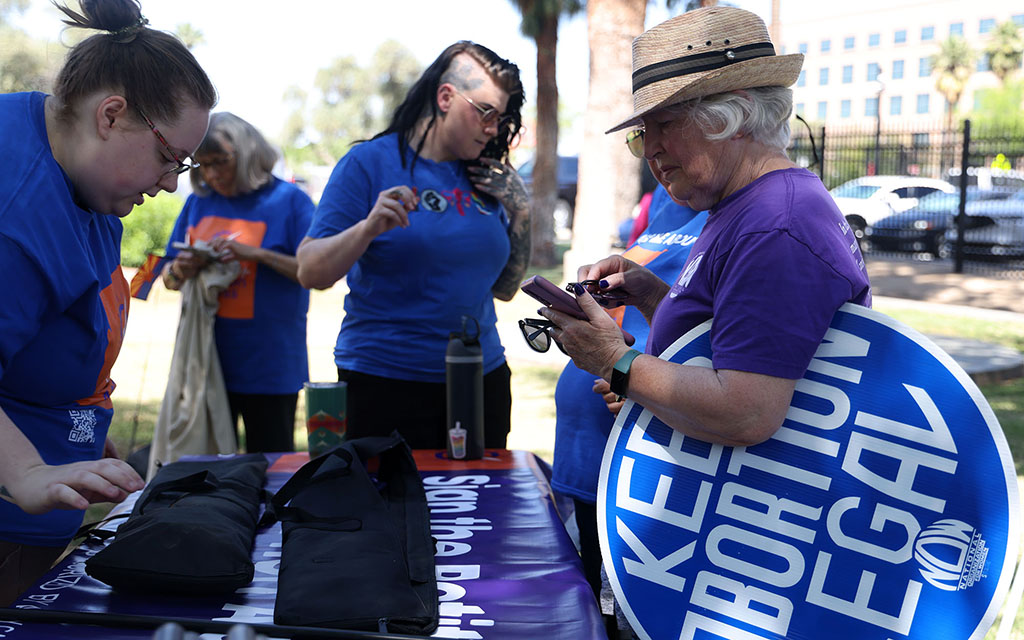
Abortion-rights advocates wait in the Rose Garden at the state Capitol complex where they turned out to protest the Arizona Supreme Court ruling that reinstated an 1864 law that implements a near-total abortion ban. (Photo by Kevinjonah Paguio/Cronkite News)
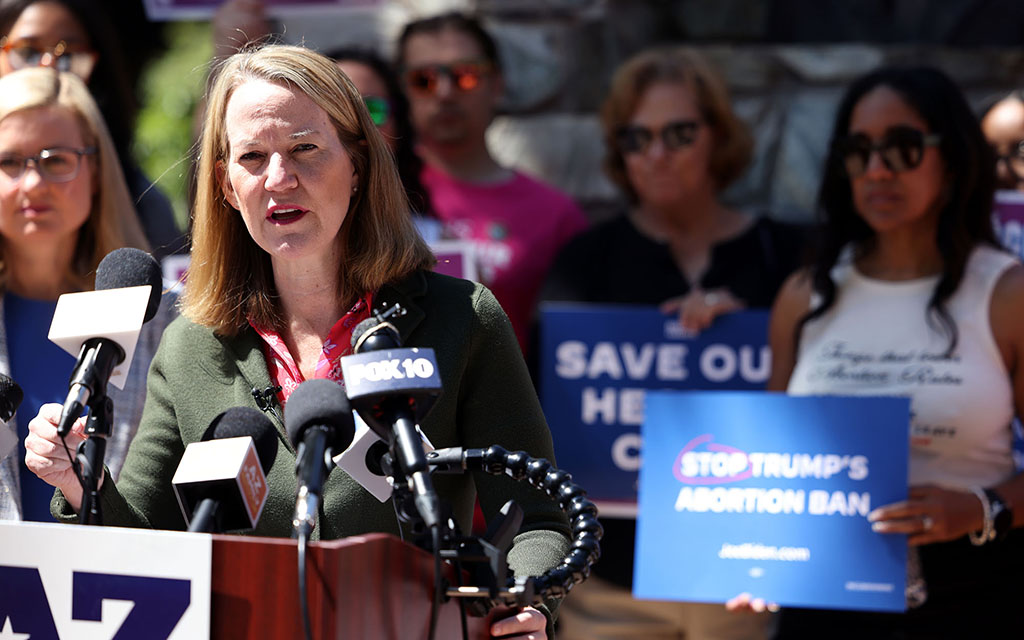
Arizona Attorney General Kris Mayes called the Arizona Supreme Court’s split decision to restore an 1864 near-total abortion ban an “affront to freedom” and vowed not to bring charges under the law. (Photo by Kevinjonah Paguio/Cronkite News)
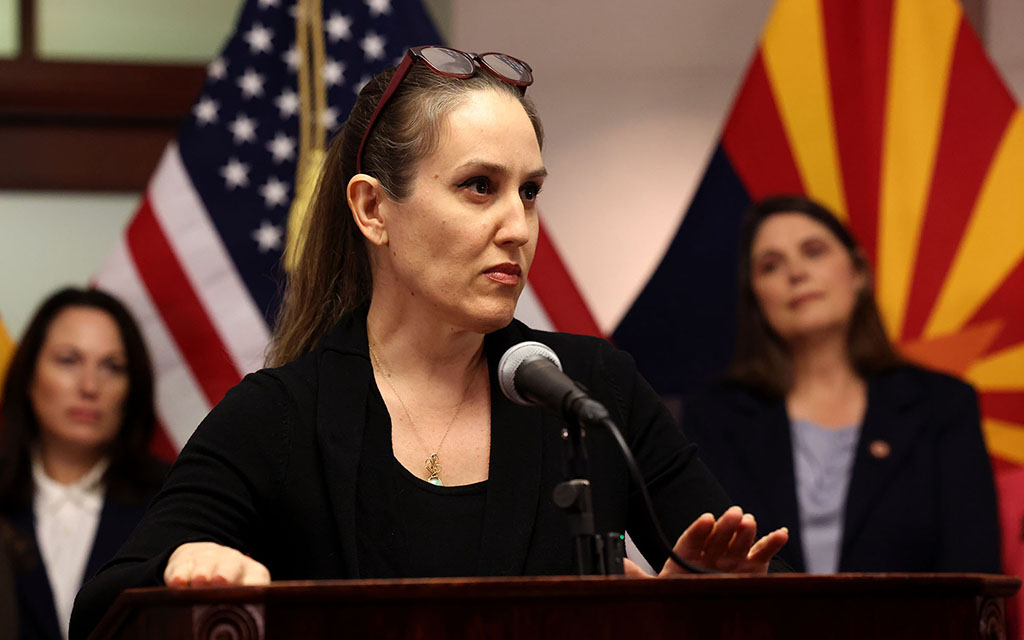
State Sen. Eva Burch, D-Mesa, a staunch abortion advocate who recently spoke on the Senate floor about her own abortion, speaks on the ban on abortions in Arizona. “Stop killing us with your arrogance,” she said. (Photo by Kevinjonah Paguio/Cronkite News)
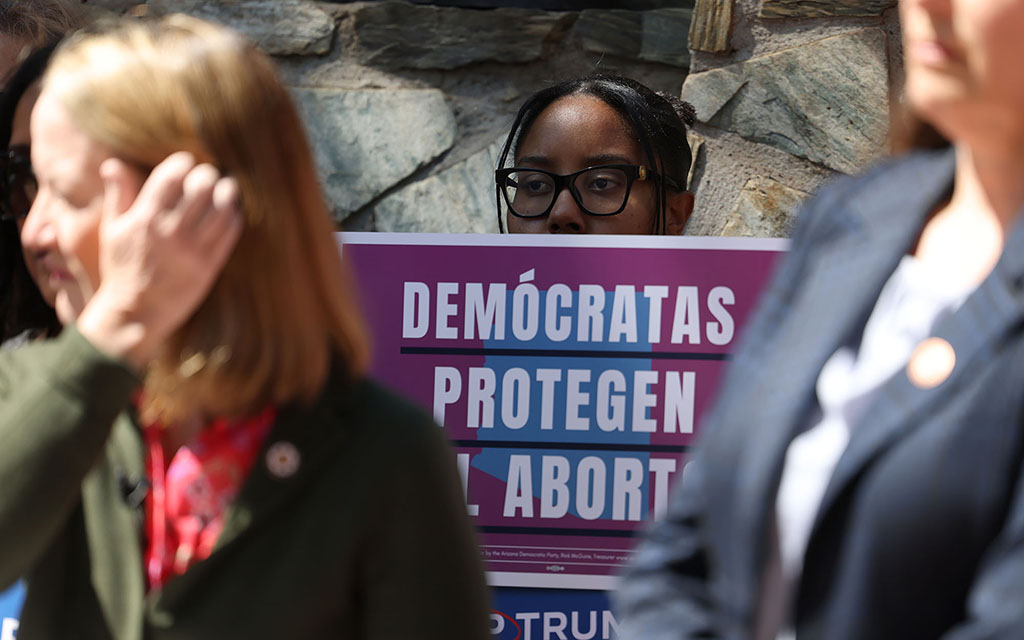
Armonee D. Jackson holds a sign supporting abortion rightsat a Democratic news conference blasting the Arizona Supreme Court allowing enforcement of an 1864 law that imposes a near-total abortion ban in the state. (Photo by Kevinjonah Paguio/Cronkite News)
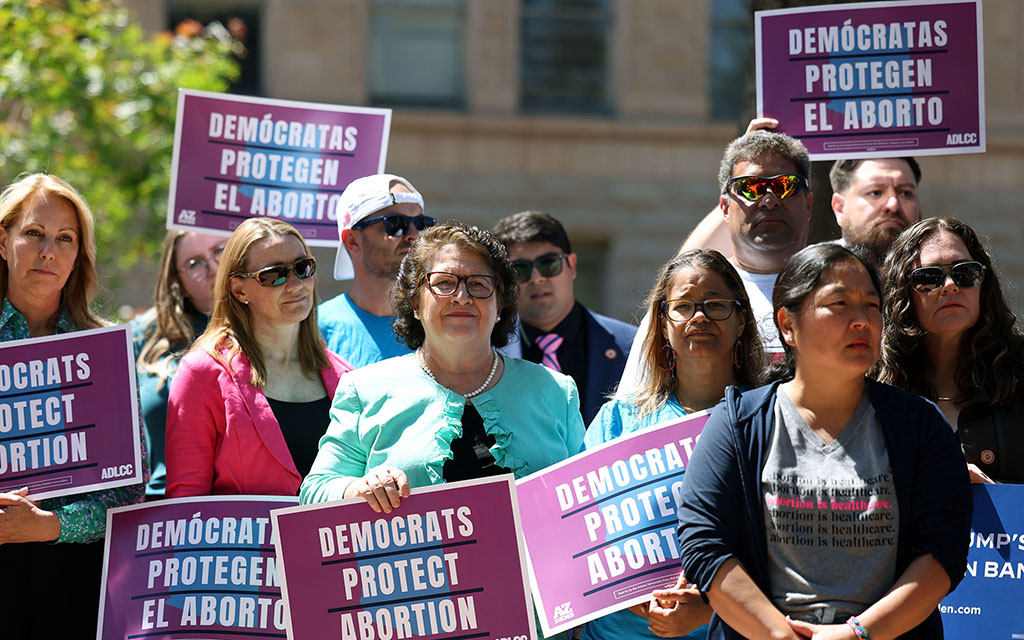
Democrats, from the local level to the White House, along with some Republicans, quickly attacked the court’s ruling. State Rep. Stephanie Stahl Hamilton, D-Tucson, said it was “the beginning of putting our anger to work.” (Photo by Kevinjonah Paguio/Cronkite News)
PHOENIX – A divided Arizona Supreme Court on Tuesday reinstated a 19th-century, near-total ban on abortion, saying it overrides a 2022 law that allowed abortions up to 15 weeks of pregnancy.
State officials said it will be another 60 days before the ruling could take effect, but the reaction was swift and angry to what abortion-rights groups called a “dark day for Arizona.”
“Today’s deplorable decision from the state Supreme Court sends Arizona back nearly 150 years,” said Angela Florez, president and CEO of Planned Parenthood Arizona, during a press call Tuesday morning. “This ruling will cause long-lasting, detrimental harms to our communities.”
The 1864 law had been on hold for decades, but never repealed. It makes it a crime to provide an abortion, punishable by up to five years in prison. The only exception is an abortion to save the life of the mother – there are no exceptions for rape or incest.
Republicans responded cautiously to – and in some cases rejected – the ruling, which will likely add fuel to what was already a high-profile fight over a proposed ballot initiative that would enshrine abortion rights in the Arizona Constitution.
Gov. Katie Hobbs called for a “complete and total repeal” of the 1864 law, which would restore the 2022 law that allows abortions up to 15 weeks. And Senate President Warren Petersen and House Speaker Ben Toma said in a joint statement that they are “closely reviewing the court’s ruling, talking to our members, and listening to our constituents to determine the best course of action for the legislature.”
But that could be a hard sell for more conservative members of the caucus, who said repealing the 1864 law now would be “unacceptable, morally wrong, and abrasively out of step” with Republican Party tenets and Republican voters.
“As Republicans, we should be proud of the fact that today the lives of the preborn are more protected than they have been since SCOTUS’ (the U.S. Supreme Court) fatally flawed Roe decision more than a half century ago,” said a statement from the Arizona Freedom Caucus.
After the U.S. Supreme Court recognized a nationwide right to an abortion in its 1973 Roe v. Wade ruling, it meant bans like Arizona’s could no longer be enforced. But the court overturned Roe in June 2022 in its Dobbs decision, plunging Arizona abortion providers and patients into a year of uncertainty while state courts determined what the current law was after 50 years of abortion-regulating legislation.
Former Arizona Attorney General Mark Brnovich moved to reinstate the near-total ban, and a Pima County Superior Court judge agreed in 2022. But that ruling was put on hold and later reversed by the Arizona Court of Appeals, which said the 15-week ban – passed shortly before Roe was reversed – was the law and that it allowed licensed physicians to perform elective abortions.
The case was appealed again to the Arizona Supreme Court, which let the 15-week threshold stand while it considered the case – until Tuesday, when it affirmed the superior court ruling and restored the 1864 law.
The majority opinion, written by Justice John R. Lopez, said that it is clear that Arizona lawmakers never overturned the near-total ban, which was only blocked because of the federal right to an abortion. Except for that federal law, Lopez wrote, the Legislature has demonstrated “an unwavering intent since 1864 to proscribe elective abortions.”
“Absent the federal constitutional abortion right …there is no provision in federal or state law prohibiting §13-3603’s (the 1864 law’s) operation. Accordingly, §13-3603 is now enforceable,” he wrote.
But Vice Chief Justice Ann Scott Timmer, joined by Chief Justice Robert Brutinel, dissented, saying it was clear that the old law does not override the 2022 law.
“The statute says what it means and means what it says: The state will prosecute physicians for performing abortions after the fetus reaches fifteen weeks in age unless a medical emergency requires the procedure,” Timmer wrote. “The state will not prosecute physicians for performing abortions before the fetus reaches fifteen weeks in age. These abortions are lawful. There is no room for misunderstanding.”
Even though the court restored the abortion ban, Arizona Attorney General Kris Mayes said in a statement Tuesday that “no woman or doctor will be prosecuted under this draconian law.” That followed a June executive order from Hobbs that allowed Mayes to “assume all duties with regard to any criminal prosecution of a medical provider … for violation of any State law restricting or prohibiting abortion care.”
Abortion opponents said that Mayes cannot block prosecutions.
“The county attorneys and attorney general have a duty to enforce the law as enacted by the state Legislature and signed by the governor, so to make a blanket statement that you would never prosecute under this law is a dereliction of duty,” said Cathi Herrod, of the Center for Arizona Policy.

Buttons supporting the Arizona for Abortion Access ballot initiative, which would enshrine the right to an abortion in the state Constitution amid attacks on abortion laws (Photo by Kevinjonah Paguio/Cronkite News)
That was echoed by Jake Warner, senior counsel for Alliance Defending Freedom, who argued the case before the Arizona Supreme Court. He said Mayes’ “authority does not extend to dictating the prosecutorial decisions of county prosecutors.”
“In our view, county prosecutors are free to enforce the law as written and so protect unborn life here in Arizona,” he said.
Abortion providers still have some time before the ruling goes into effect. And Planned Parenthood Arizona, which provided nearly 3,000 abortions across its four locations in 2022, said it expects to continue providing abortion services through May and potentially into June.
More than 11,000 women had abortions in the state in 2022, at least 340 of which were done for reasons of maternal health, according to the Arizona Department of Health Services. About 95% of those abortions were done before 15 weeks.
The ruling comes as abortion-rights groups are pushing a ballot initiative that would amend the state Constitution to “establish a fundamental right to abortion” in Arizona. The Arizona for Abortion Access Act would allow abortions up to fetal viability and includes exemptions beyond that point “if necessary protect the life or physical or mental health of the pregnant individual.”
Supporters of the initiative said Tuesday that they have already collected more than 500,000 petition signatures, well over the 383,923 needed to put it on the November ballot.
Both Timmer and Lopez took pains in their opinions to say their decisions were based on law, not politics. But the ruling presents a politically charged issue for Arizona lawmakers.
While the decision was roundly opposed by Democrats, some Republicans also expressed disapproval. Rep. Juan Ciscomani, R-Tucson, called the ruling “a disaster for women and providers.”
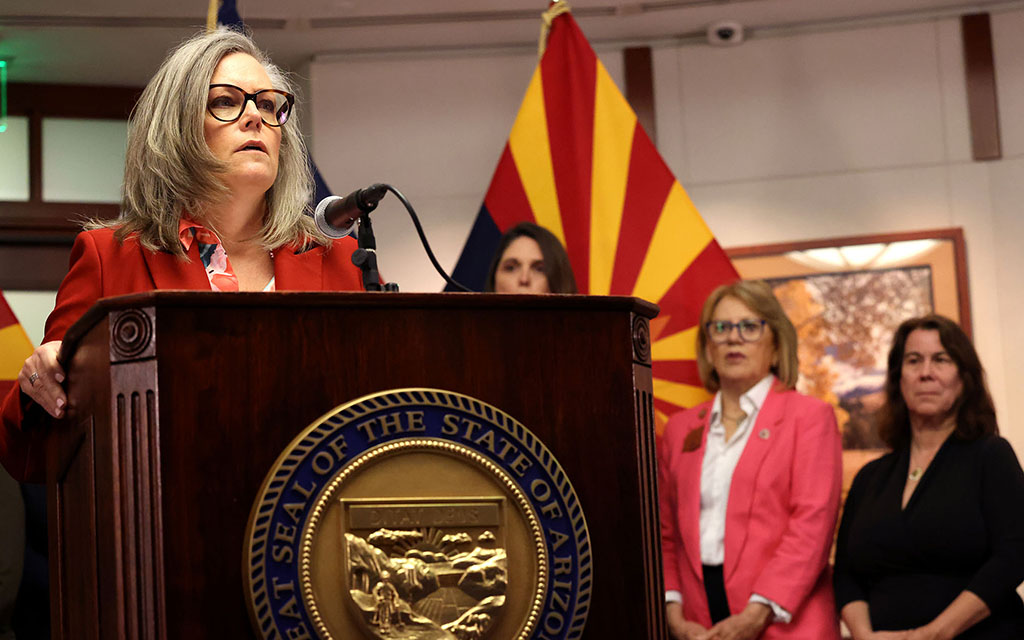
Gov. Katie Hobbs, a Democrat, said the 1864 abortion ban reinstated by the Arizona Supreme Court “must be repealed immediately.” Republican legislative leaders said they were reviewing the ruling to “determine the best course of action.” (Photo by Kevinjonah Paguio/Cronkite News)
“The territorial law is archaic,” Ciscomani said in a statement. “We must do better for women and I call on our state policymakers to immediately address this in a bipartisan manner.”
Republican Senate candidate Kari Lake also opposed the ruling, saying in a statement that “it is abundantly clear that the pre-statehood law is out of step with Arizonans.”
State and federal Democrats said those Republicans who are coming out against the 1864 law now are merely “trying to cover up a long history of taking away abortion rights.” Rep. Ruben Gallego, D-Phoenix, a likely opponent to Lake in the Senate race, said she has a long history of supporting extreme abortion restrictions.
The White House quickly weighed in on the ruling. President Joe Biden called it the result of “the extreme agenda of Republican elected officials … committed to ripping away women’s freedom,” and Vice President Kamala Harris will travel Friday to Tucson as part of her ongoing “fight for reproductive freedoms” tour.





